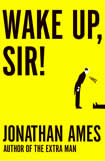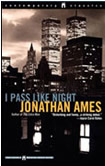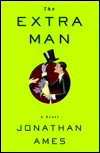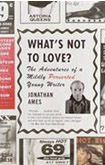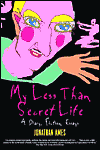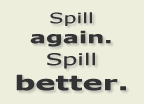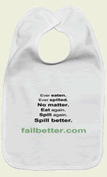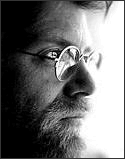|
||||||||
|
|
||||||||||
|
|
Jonathan Ames
|
||||||||||
| * * |
How exactly did Jeeves come into your employ? That is, what inspired you to write Wake Up, Sir!? Do you have a Jeeves in your own life? If not, would you like to?
Well, several years ago, I would often find myself in dangerous spots—I frequented boîtes where a good deal of transgression would go on—and I was rather Janus-Minded when put in these situations, and out of this cleaved Janus-Mind, Jeeves was born. You see, my Super-Ego wanted to stay and my Well-Behaved Ego thought I should go. (I'm using Caps because I'm reading Evelyn Waugh's The Loved One, and he uses a lot of Caps and I'm enjoying them, and so, like a parrot or an easily influenced person, now I'm using them.) So the Well-Behaved Ego would say: "Home, Jeeves!" It said this as if there was a Jeeves inside me that would take me home. And sometimes this inner-Jeeves would take me home, and sometimes it wouldn't and then I might find myself in a motel in the spooky wastelands of New Jersey, behaving like Dorian Gray, but with far less class...
So out of this cry for help to some Inner-Jeeves was born the character; of course, I was and I still am a huge Wodehouse fan, and during a depression in 2000—I think it was '00—I read a lot of Wodehouse as an attempted cure, a sort books-instead-of-Prozac approach... And so then in the book, I give the narrator, Alan Blair, this same cure, an overdose of Wodehouse, which did work for both of us. And so the Jeeves character was also born out of this massive Wodehouse absorption on my part...
I originally titled the book Home, Jeeves!, but had to change this for legal reasons, which is perfectly understandable, since it would have mislead Wodehouse fans, though that wasn't my intention when I came up with the title; it was, as described above, a personal thing, my inner-cry for salvation on school-nights when my life was in danger. Anyway, as it is, changed title and all, I've been very careful to illustrate in the book that my Jeeves is not the great Jeeves as created by the great Wodehouse.
You've described Wake Up, Sir! as a "novel about an alcoholic with a nose fetish." Would Jeeves approve of this description? It seems that drinking plays a prominent role in many of your works (as, we are told, it once did in your life). What makes intoxication in fiction, so… intoxicating?
When did I describe this book this way? In an email? If so, that's a pretty good description and so I won't denying stating it, though I don't remember stating it. That said, I don't think Jeeves would approve or disapprove; he's very accepting; he might think it momentarily crude, but only momentarily and not even too consciously—he's a great filtre (I like the British spelling of 'filtre') of forgiveness; with Jeeves all things are immediately accepted and forgiven; I think he knows innately how flawed and confused human beings are... Granted he might not forgive intolerably cruel behavior, but the kind of behavior which summarizes a novel as 'about an alcoholic with a nose fetish', he can very easily forgive and accept. And that kind of behavior is a symptom of low self-regard, of always having to play the clown, to dismiss myself; it's an Oedipal thing: I can't appear to be a threat to my Father, so I must always play the fool. But this is also a strength, since Fools and Clowns are much needed, and, actually, "about an alcoholic with a nose fetish" is quite on-target and not really derisive.
About Drinking. I don't know if it's so intoxicating to write about, but maybe it is. I think detailing a person's booze habits, like writing about sex, is good for fiction, because it—to use workshop language—reveals Character. (I realize I had eased up on the Caps, though I just added the thing about Clowns and Fools.) A pursuit of booze can mean so many things—chasing after Spirits, self-destruction, delusion, a need for self-medication... Also, people who booze too much get into trouble and fiction needs trouble. I once had a dream in which I was teaching a writing workshop and I said: "No pain, no story." A very cheesy dream, but not without some relevance.
We noticed those scene summaries at the beginning of each chapter. They read a lot like a Wodehouse chapter title (e.g. "Jeeves, my valet, sounds the alarm") and remind us of the headers in Cormac McCarthy's Blood Meridian. Where these one-line summaries an afterthought? Or did you use them as a means to outline each chapter? Do you use an outline for your novels?
The summaries are sort of an homage to Don Quixote, and other Old-Fashioned Novels, which employ those kinds of summaries, almost like advertisements or warnings for the reader: if you don't like the summary, maybe you had better not continue, or if you like the summary, this will spur you on to read. I will say that I'm fully expecting people to not even read the summaries... but if they do, they will find little jokes and odd phrases and an overall silliness... I would always write the chapter first and then write the summary, always wanting to allude but not give away...
When I write a novel (three now), I don't outline at first... Like most writers, I blunder forward for a while, with some vague notion or goal, and then as time and material collects, then I do an outline, which is like a map to follow or stakes in the side of a cliff... The outline does change, but its good to have as one presses on.
Wake Up, Sir! asks the age-old question: asylum, artist colony, what's the difference? Your answer?
Having been in both, I would definitely say that artist colonies are much more pleasant. (I'm being overly dramatic: in 1987, I was in some kind of capitalistic rehab which bled people's insurance companies, but it was kind of like an asylum: lots of people were medicated, we were locked up, etc.) So artist colonies are more fun, but there are similarities: they're both Hot-Houses for Emotion. You get quickly and overly attached to people in a very short period of time; in regular life, it can take years to get an obsession for someone but at a colony or an asylum it can happen in days or even hours. It must be what living in a village was once like...
In recent years, you have become quite the literary celebrity. You've written columns for The New York Press, performed one-man shows, appeared on David Letterman's Late Show, and written a hilarious diary for Slate.com. Are Jonathan Ames the celebrity and Jonathan Ames the writer the same person?
No, they are two people. I met this fellow named Jonathan Ames on the internet who was also a writer—he did a search to find other Jonathan Ameses and came up with me as well as a very nice Mormon fellow in Utah—and we decided to pool resources (just the two of us, not the third Jonathan Ames) since we already shared the same name. So he's the writer and I'm the celeb, but he's allowing me to write these responses to the Q&A.
That said, I do thank you for calling me a literary celebrity; though despite the division of labor with the other Jonathan, I don't quite feel that I'm a celebrity; I'm sure that most writers would make the same false-sounding humble protest, but it's really not false, especially when said writer (this Jonathan) knows that he still has more debt than savings, and it seems to me that most celebrities, literary or otherwise, have to have as a prerequisite to celebrity a bank account that is in the black, not the red.
We've mentioned your diary entries for Slate.com and your rather entertaining self-described meanderings in Brooklyn. "Brooklyn" novels are all the rage these days—any plans to write one of your own? Or has Brooklyn been over-written?
I don't think Brooklyn has been over-written; it's very large, larger than Manhattan, so I think it can support quite a few novels. At this time, I'm not planning a "Brooklyn Novel"; I'm planning an Academic Novel, set in the Middle West.
Prior to their discussion of the "Great American Novel" Alan and Jeeves raise the notion that Stephen King may be the modern equivalent of Dickens. Do you think it is possible that the likes of King, Crichton, Clancy and Grisham could go down in history as classic American authors? More importantly, given your well-documented boxing career, could you beat Stephen King in the ring? (To be fair, we mean before he was hit by a car, of course…) What strategy would you employ in fighting the man?
Stephen King might be the one person who is read in centuries to come... His fame might have a long shelf-life, the enormity of his production; then again, there may have been other popular authors of yesteryear of whom we hear very little now... But I'd put my money on King to be read after he's dead... It would be interesting to know the percentage of writers who are read after they die, must be very tiny... Now-a-days so many books are written—there may be less readers, but there are more writers—that the percentage will be even less... Hard to know who the real lasting geniuses are... Of current writers, the only one I'm really sure who will be read after his death for some time is [Garcia] Marquez. Personally, I'm not concerned with that. Hard enough to be read while living. And hard enough to be alive than to worry about one's writerly after-life. Actually, this is a rather morbid topic.
Oh, you asked about boxing King. That's one of those hypothetical questions that's pretty much impossible to answer. I wouldn't box him because I'm retired from the ring. And if I wasn't retired, I wouldn't want to fight him: the age difference alone would be unfair. The boxing ring is a terrible equalizer: he's probably strong and all that, but I'm probably 20 years younger... Anyway, I wasn't very good at boxing: you need a certain amount of anger (it takes a base level of anger to hurt someone) and I've always been better at generating depression instead of anger.
In Wake Up, Sir!, Alan writes "The Great New Jersey Novel." Like your earlier novel, The Extra Man, his opus documents the protagonist's flight from New Jersey to New York. What is it about New Jersey that does this to people?
He doesn't write the "Great New Jersey Novel"; he speculates that maybe this will be his goal since writing the "Great American Novel" seems a bit beyond him, but he does think he could maybe write the best novel for one state... Just want to be clear. He's pretty humble about his writing... Yes, there's a similar exodus, but with some difference: in The Extra Man the character goes from New Jersey to New York City, and in Wake Up, Sir!, the character goes from New Jersey to New York State, though in the back-story he once did go from NJ to NYC... You see, Alan Blair of Wake Up, Sir! is sort Louis Ives from The Extra Man, his personal history is the same as Louis's, but he's perhaps Louis a few years later and he's working on a book about his days in NYC and it's called The Walker, which is a term that is very similar in meaning to The Extra Man... So you see, I'm playing my own Philip Rothian games with my narrators... But only fans of The Extra Man will pick up these parallels; people who haven't read The Extra Man won't miss anything... In fact, I included in Wake Up, Sir! two things I cut from The Extra Man as samples of the book—The Walker—that Alan is working on... Anyway, I'm sure that all sounds confusing.
New Jersey and New York: there's nothing wrong with New Jersey, but it is the moon and New York is the earth—the smaller is drawn to the greater... the earth and the sun, etc.; well, this is the case for Northern New Jersey; Southern New Jersey is drawn to Philadelphia...
Lastly, if Jeeves could live anywhere, where would that be? With whom?
Well, I think Jeeves is pretty content wherever he is... Rather spiritual that way, if you know what I mean. Where I'd like to live, especially if the Mercury levels get any worse in this country and the politics any more horrible, is this small Caribbean island I once did a travel-piece on: Bequia. I'd like to live there and eat fish and fruit, and swim in the sea and be at peace. It's a boring little revel and quite clichéd, but having seen Bequia, I know that a very nice life could be had there... Thank you for all these very nice questions!
© failbetter.com

